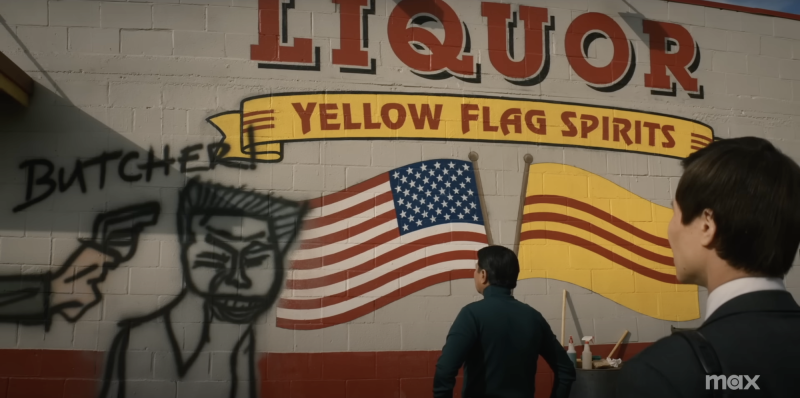Set in the Korean War of the early 1950s, M*A*S*H, the CBS dramedy about wisecracking U.S. Army doctors, was among the most popular shows in the country during the Vietnam War’s final years. It was heavy with anti-military, anti-war sentiment, evoking the zeitgeist of a Vietnam-exhausted populace. “War isn’t Hell,” Hawkeye Pierce, played by Alan Alda, says in a typical line. “There are no innocent bystanders in Hell, but war is chock full of them.” (The Robert Altman film the show stemmed from deliberately minimized references to Korea to maximize its unspoken commentary on Vietnam.)
‘The A-Team’ (1983-1987)
Television’s first regular portrayal of Vietnam veterans came in the form of a cartoonish crew of daring mercenaries that reflected the era of Reagan and Rambo. NBC’s The A-Team, whose members included a mohawked-and-gold-chained Mr. T and a cigar-chomping George Peppard, were a “crack commando unit” who were innocent fugitives from military justice and worked as mercenaries pulling off weekly capers. Explosions and jumping cars abounded. In a fourth-season episode, the team returns to Vietnam for a job. Peppard’s Hannibal momentarily struggles with dark war memories before getting back to the lighthearted action.
‘The Welcome Home Concert’ (1987)
HBO aired and helped organize a 1987 charity concert dubbed Welcome Home that billed itself as the warm celebration Vietnam War veterans never got upon their return. Performers included James Brown, Linda Ronstadt and Stevie Wonder. The July Fourth concert was not a militaristic affair, and had a hate-the-war, love-the-troops vibe. Some of the most anti-war songs of the ’60s were performed by artists like John Fogerty and Crosby, Stills & Nash. The event would be a harbinger of a wave of cultural nostalgia and reckoning as baby boomers began turning 40 and were in the mood to reflect.
‘Tour of Duty’ (1987-1990)
With Tour of Duty, the Vietnam War finally came to prime time. The CBS series that premiered in 1987 showed actual combat and the young men who fought and died in it. It might have been called Platoon: The Series, after the Vietnam film that had just won best picture at the Oscars. Surprisingly gory and gritty for a network show, it had all the hallmarks of the era’s many Vietnam movies. But executives seeking lower costs and higher ratings — which never came — eventually moved production from Hawaii to California and introduced romances and soapy plotlines typical of TV dramas.
‘China Beach’ (1988-1991)
And suddenly, there were two Vietnam series on TV. ABC’s China Beach was part-M*A*S*H, part-Grey’s Anatomy, part-Mad Men. Set in a wartime evacuation hospital — the title was the Americans’ nickname for My Khe Beach in Đà Nẵng — it focused on Army medics and civilians. It was festooned with ’60s songs whose copyrights have kept the series off streaming services. Beloved by critics, China Beach made a star and a best-actress Emmy winner of Dana Delany, but never found a mass audience. With its cancellation, network TV depictions of the war would disappear for years.
‘The Wonder Years’ (1988-1993)
The Wonder Years was baby boomer nostalgia in its purest form. The ABC series, narrated by an adult Kevin Arnold (voiced by Daniel Stern, played as a child by Fred Savage), depicts his boyhood feelings and experiences with the backing of sentimental ’60s songs. The specter of Vietnam dominates its first season, which sees Kevin’s hero — the big brother of his neighbor and crush Winnie Cooper — die in the war. In a 2021 reboot, the story shifts to a Black family in Alabama, with narrator Dean Williams’ brother a returning Vietnam vet who faces racism at home.
‘The ’60s’ (1999)
The NBC miniseries The ’60s was a roundup of the decade’s cliches that by then had been well-established in movies and TV. The 1999 two-night event was billed as “the movie event of a generation.” Its subjects were three Chicago siblings who each go on very 1960s journeys. For Jerry O’Connell’s high-school quarterback character, that meant serving in Vietnam. He enlists in a gung-ho moment, but by the show’s second night, he’s back home with an Army jacket and long hair, drinking to bury his trauma. The show drew a big audience at a time when NBC was ratings king.
‘This Is Us’ (2016-2022)
The time-hopping, tear-jerking NBC family drama This Is Us used the Vietnam War to delve into the psyche of Jack Pearson (Milo Ventimiglia), who refused to talk about his experience as a soldier with his wife and kids before his premature death. In dual plotlines that run through its third season, with the emotional themes and folk-acoustic soundtrack that are hallmarks of This Is Us, Jack is shown enlisting to try to protect his drafted younger brother. Decades later, his son Kevin (Justin Hartley) travels to Vietnam to find out what happened to his father and uncle.
‘The Vietnam War’ (2017)
In a docuseries that ran over 10 nights on PBS, the Vietnam War got the same hallowed treatment Ken Burns brought nearly 30 years earlier to the Civil War. Burns and Lynn Novick’s The Vietnam War was not as soft or sentimental as his reputation might have suggested. It was a rare PBS show with a TV-MA rating, and its tone, with a modern soundtrack from composers Trent Reznor and Atticus Ross, matched the messiness of the conflict. The show went to lengths to include a North Vietnamese perspective along with American and South Vietnamese vets and historians.
‘The Sympathizer’ (2024)


